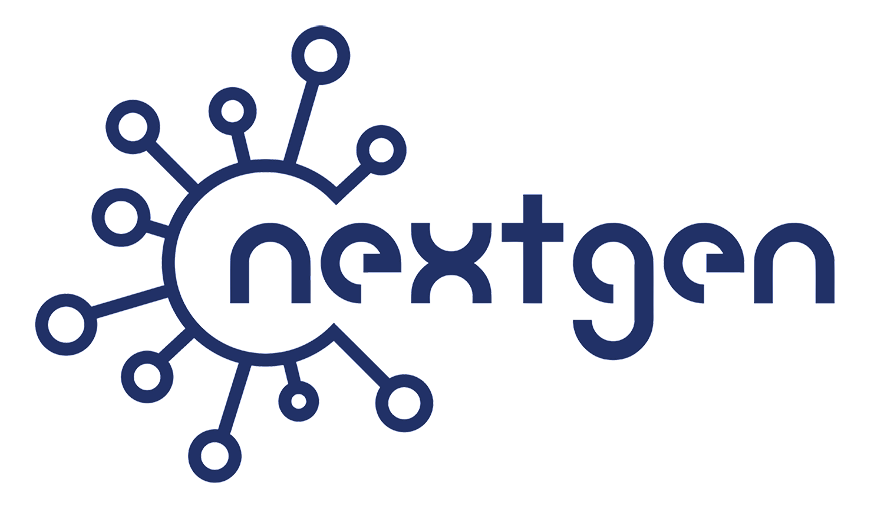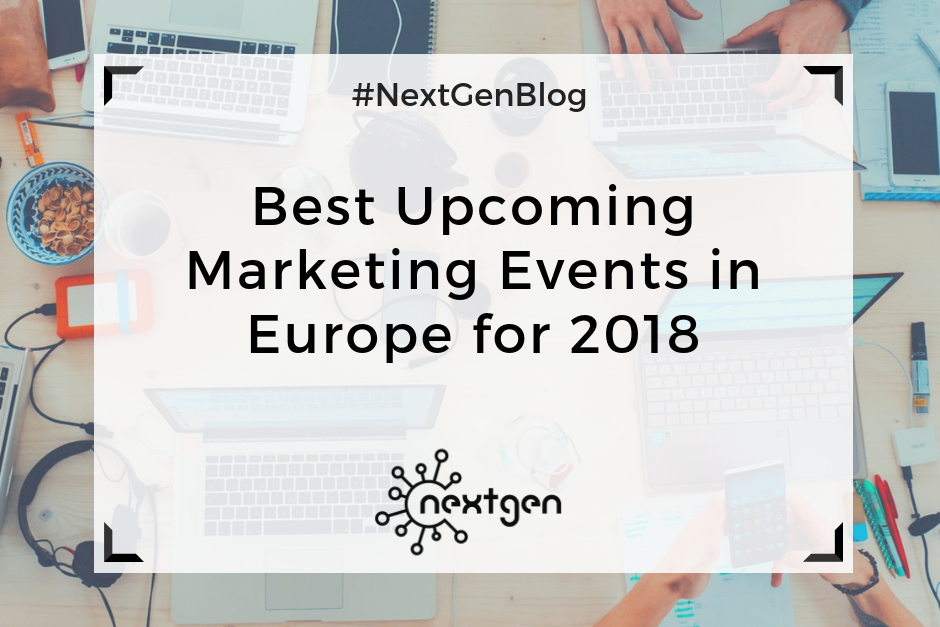
by Sofi | Aug 24, 2018 | Other
Every year multiple marketing events take place in different cities around the world in various forms: conferences, summits, workshops and classes, seminars, trade shows and expos, etc. People gather together at these events for the purpose of networking, learning about new products and technologies, searching for new business opportunities, discussing important marketing topics and trends, and more.
Here is a list of the best upcoming marketing events for 2018:
#1 DigiMarCon (Digital Marketing Conference)
Date and location: 5-6 September – London, UK
Starting price: £497
Website: https://digimarconeurope.com/
DigiMarCon is one of the most important marketing conferences in Europe. Attending this conference will provide you the opportunity to learn about digital marketing from many marketing experts, as well as the opportunity to network with other marketers and business professionals. Some of this year’s conference topics include: Digital Strategy, Web Experience Management, Mobile Marketing & Retargeting, Social Media Marketing, Video Marketing, Email Marketing, Data Science & Big Data, Growth Hacking, Programmatic Advertising, and other relevant digital marketing topics.
#2 Web Summit
Date and location: 5-8 November – Lisbon, Portugal
Starting price: €495
Website: https://websummit.com/
The Web Summit is considered the largest technology conference in the world and is held annually since 2009. Last year, the conference had 60,000 attendees, which ranged from 500 Fortune companies to small companies within the technology industry. As of 2016, Web Summit is a host to various independent conferences; this year there will be 25 conferences, some of which include: AutoTech, ContentMaker, Corporate Innovation Summit, DeepTech, Growth Summit, Startup University, etc. The Web Summit is an event focused on internet technology, so digital marketers can greatly benefit from attending it.
#3 #DMWF Conference & Expo
Date and location: 19-20 September – Amsterdam, Netherlands
Price: €399 for one day, €699 for two days
Website: https://digitalmarketing-conference.com/europe/
The #DMWF Conference & Expo takes place in Amsterdam next month, and it is an event focused on digital marketing and social media. If you want to learn from some of the most disruptive thought-leaders in the industry–then this is the right event for you. Some of the session topics that are going to be covered this year are: successfully forming an interactive digital content marketing strategy to increase engagement, exploring the value of your website analytics, the value of diversity in marketing, understand how VR and 360 are transforming the marketing and communication industries, understanding the way AI is going to revolutionize and impact on the way brands interact with customers, and other important topics.
#4 NEXT Conference
Date and location: 20-21 September – Hamburg, Germany
Price: N/A
Website: https://nextconf.eu/
NEXT conference is a two-day event where you can learn about important digital trends and how they transform the marketing industry. The main topic for the conference this year is “Digital Fix – Fix Digital,” which is exploring the ways in which the digital world can be transformed. Attendees of this event will have great networking opportunities, as well as an opportunity to enjoy good music at the Reeperbahn Festival. You can get a ticket to attend the conference by applying for one of the four attendee groups: Regular Attendee, Startup Attendee, Student Attendee, or Press.
#5 Social Media Week London
Date and location: 14-16 November – London, UK
Price: £519 (Standard pass), £795 (Premium pass)
Website: https://socialmediaweek.org/london/
The SMW London is a leading three-day conference for marketers that explores how social media and technology influence business, society, and culture. This year the conference’s main theme is “Closer” which will explore the conflict between community and individualism. Three important sub-themes will also be discussed: The You Universe, The Social Divide, and AI vs. Humanity. If you’d like to learn about the newest trends and best practices in social media from leading business and marketing experts, then don’t miss the opportunity to attend SMW London this November.
***
Attending these types of events can be very beneficial for your business because it’s a great way to meet relevant people from the marketing industry and learn valuable information that you can later use to improve your marketing efforts.
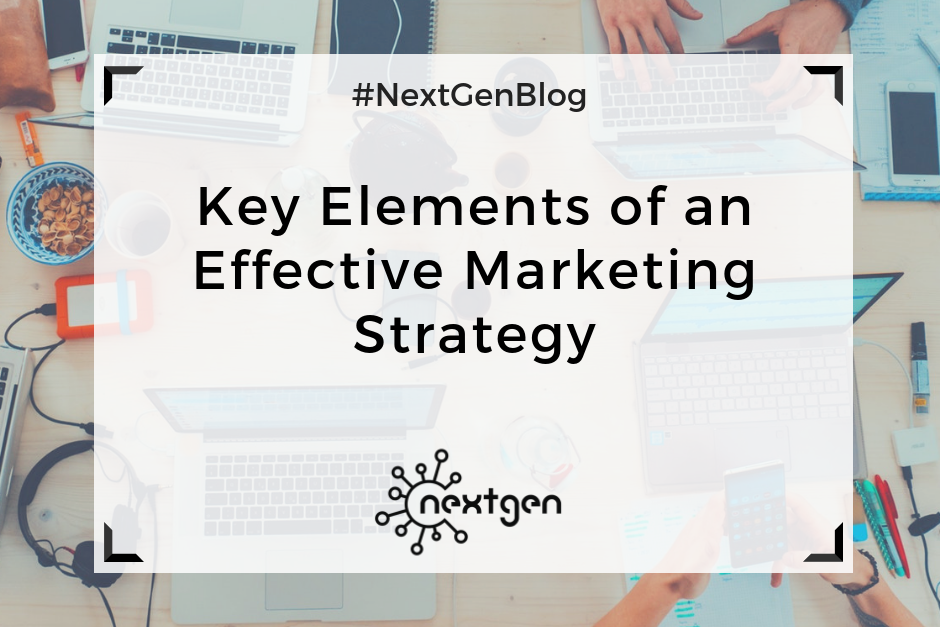
by Sofi | Aug 10, 2018 | Marketing Strategy
Coming up with an effective marketing strategy is very important for the success of your business because it can help you get new customers, increase sales, and gain a sustainable advantage over your competition. Essentially, a marketing strategy details what you want to achieve for your business and a plan of how you’re going to achieve those things.
These are some key elements that you should include in your marketing strategy:
#1 Goals
When you create your strategy, the first thing you need to do is to clearly define your business and marketing goals. Your goals may include increasing profits, getting new customers, building brand awareness, or anything else you want to achieve for your business. Setting realistic goals will help you decide where to focus your marketing efforts.
#2 Segmentation, targeting, and positioning
Identifying your potential customers and their needs is an essential part of a successful marketing strategy. You can conduct customer research to find out which customer segments you need to address. Then, you should evaluate the attractiveness of each segment and decide which segments you are going to target. Finally, you should develop a positioning strategy for each of your target customer segments.
#3 Brand messaging
Brand messaging communicates the value of your brand to your target audience and should ultimately convince them to buy your products or services. A unique and powerful brand message is one that people can easily associate with your brand. So, make sure the message you craft tells a story that makes your brand noticeable and differentiates you from your competitors on the market.
#4 Communication with customers
Maintaining effective communication with your customers is crucial for your success. So, another important component of a good marketing strategy is planning your communication tactics. You should know when and how to communicate with your audience to build and maintain meaningful connections.
#5 Promotional Activities
Once you know your goals, identified the elements of the STP process, have a nicely crafted brand message, and planned your communication strategy–it’s time to plan how you are going to promote your business, products, and services to your audience. You can achieve this with any type of promotional activities, such as: advertising, public relations, sales promotions, digital marketing, etc.
#6 Monitoring and evaluation
You should constantly monitor and evaluate your marketing strategy to know what works and what doesn’t. This way you’ll be able to make more informed decisions in the future and improve your marketing strategy over time.
#7 Marketing plan
When you have your marketing strategy prepared, the next step is creating a marketing plan of how you’re going to execute that strategy. The marketing plan should detail all the marketing activities you’re going to undertake and when. You need to have both a good marketing strategy and a good marketing plan for your marketing to be effective.
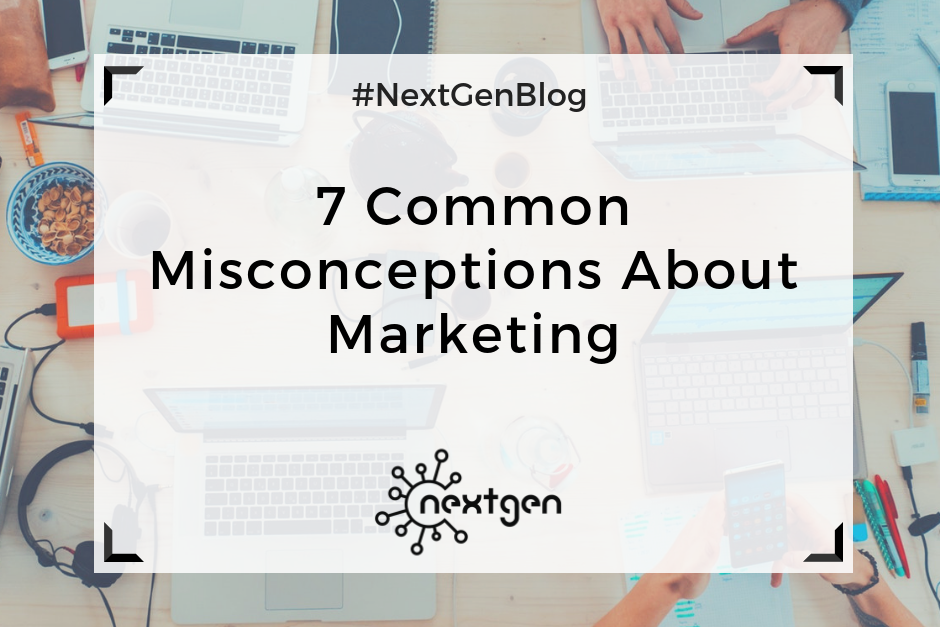
by Sofi | Jul 13, 2018 | Other
A lot of businesses struggle with marketing, which is often due to the fact that they don’t correctly understand how marketing works. Maybe your business is not an exception. But having a wrong approach to marketing might cost you a lot: it might lead to customer loss, decreased sales, financial loss, etc.
To help you avoid all that, here’s a list of 7 common misconceptions about marketing you should be aware of:
#1 Marketing is just advertising
This is one of the most common beliefs people have about marketing, and it’s completely wrong. Although advertising is a significant part of marketing, they are not the same thing. Advertising is a form of marketing communication, while marketing is a concept covering a wide range of activities. Market research, product development, pricing, distribution, coming up with marketing strategies, creating marketing plans, and other similar activities are all part of marketing.
#2 Small businesses don’t need marketing
People who own small businesses often consider marketing irrelevant for their success. This is the wrong mindset because marketing is essential for the success of any type of business. If, for example, you’re a small business owner who needs to increase brand awareness and customer base–you can’t do it without marketing. Additionally, marketing your products and services will help you increase sales, which will lead to increase in your profits as well.
#3 You can’t invest in marketing if your business is on a tight budget
Although having a small budget will limit how much you can invest in marketing activities, this doesn’t mean you shouldn’t invest at all. Furthermore, not all types of marketing require financial investment. You can always take advantage of free and low-cost marketing options such as social media, email marketing, or telemarketing. At the end of the day, your budget should never stop you from marketing your business.
#4 If you need to make budget-cuts, cut the marketing budget first
When business owners make budget cuts, they first think of the marketing sector because they consider it least important. This is not a clever strategy since good marketing can only increase your earnings and therefore your budget, while total absence of marketing might lead to an even bigger budget loss.
#5 Social media is not a relevant marketing tool
On the contrary, social media has become one of the most important modern marketing tools, and social media marketing is on the rise. Nowadays everybody is on social media, from youngsters to elders. And any successful, famous brand and business owns a social media page. This is because social media is inexpensive, easy to use, great for building brand awareness and engaging with your customers.
#6 You only need to market to new customers
Once you’ve acquired some customers, don’t make the mistake of thinking they’re bound to stay forever. If you never market to your current customers, they might lose interest in your products and services and find whatever they need elsewhere. Obviously, it’s very important to market your business to new people and continuously increase your customer base as well–but don’t direct all your marketing efforts towards that goal.
#7 Traditional marketing is dead
Many modern marketers and business owners now think that traditional marketing is obsolete, and digital marketing is the only type of marketing that gives positive results. Although it’s true that digital marketing works great, that doesn’t mean you should completely erase traditional marketing from the picture. Depending on your goal and budget, traditional marketing can often be the best option for your business. Word of mouth marketing, TV, and radio, for example, are still one of the most effective forms of marketing available, and they’re not going away soon.
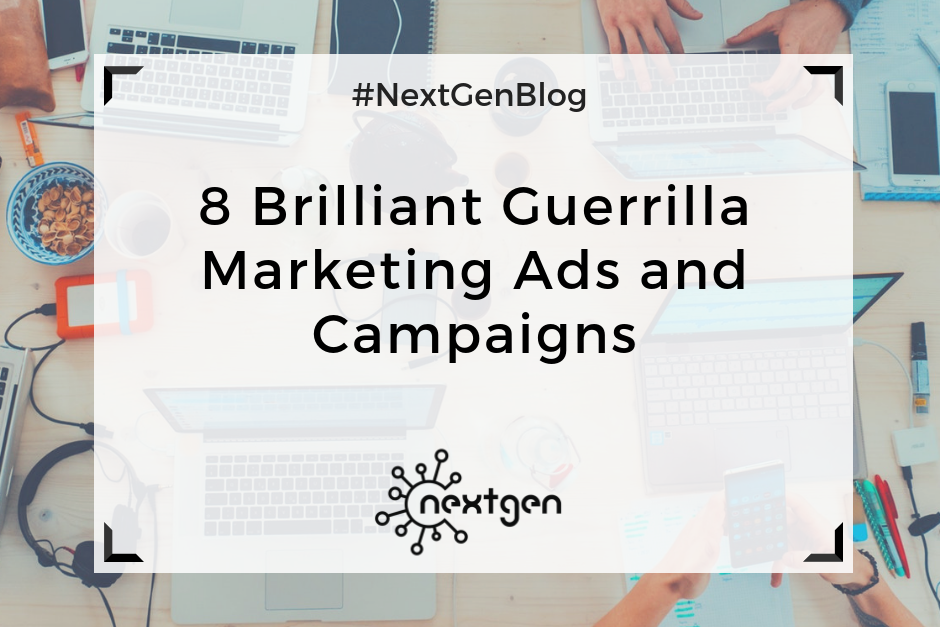
by Sofi | Apr 6, 2018 | Other
Guerrilla marketing is an advertising concept that uses unconventional methods to promote a brand’s products and services. It is usually done with a low budget, and it is focused on getting the attention of the public in a unique way. Although it takes a lot of creativity and imagination to create a guerrilla marketing ad or campaign, it can be very beneficial as well. It can easily increase brand awareness and recognition, as well as drive sales. There are various types of guerrilla marketing: ambient marketing, ambush marketing, stealth marketing, viral/buzz marketing, guerrilla projection advertising, grassroots marketing, wild posting, astroturfing, and street marketing.
Here are 8 examples of attention-grabbing and memorable guerrilla marketing ads and campaigns.
#1 KitKat
KitKat took ordinary benches and turned them into genius ads. They made the benches look a lot like KitKat chocolate bars and added the brand message: “Have a break. Have a KitKat.”- inviting people to take a break and relax on the benches.

#2 McDonalds
Here is just one notable example of how the fast food giant McDonalds used guerrilla marketing, who is known for adapting this style many times in various ways. They painted a crosswalk to look like McDonalds fries as a cool way to target countless pedestrians and drivers that cross that street every day.

#3 National Geographic
National Geographic promoted their National Geographic Museum with a fun guerrilla marketing campaign. With simple dots, they connected their photos of lions and leopards to a framed text saying: “What’s it take to get this photo? Stand here with a camera for three years.”

#4 Nike
Nike ads are all about motivating people to move. Their brilliant guerrilla campaign in New York aimed to motivate people to run. They drew their logo on park benches and added the word “RUN” next to the logo. The benches’ seating panels were removed, implying people should run instead of sitting down.

#5 Jeep
Jeep promoted their vehicles by creating a simple but creative street marketing campaign. Across the city of Copenhagen in Denmark, they painted parking spaces across unusual places like stairs and trees, depicting the way Jeep drivers can park their vehicles.

#6 IKEA
IKEA is one of the most creative brands when it comes to guerrilla marketing. They implemented the concept multiple times in different cities across the world. Memorable examples are the Paris metro and bus campaigns, where they placed IKEA sofas in metro stations and bus stops across the city. Passengers were able to wait for their train or bus sitting on one of IKEA’s cozy sofas.

#7 Tyskie
The Polish beer brand Tyskie proved that simple advertising can be highly effective if done right. All they did was place stickers of beer mugs with their logo behind the door handles of restaurants, bars, etc. People entering the doors would feel like they were reaching out for a cold Tyskie beer.

#8 IWC
IWC, the luxury Swiss watch manufacturer, found a very simple yet original way to advertise their famous Big Pilot watches. In airport busses, they attached photos of the watches to the hanging straps so that anybody could experience the illusion of trying on one of their luxury Big Pilot watches while on the bus.

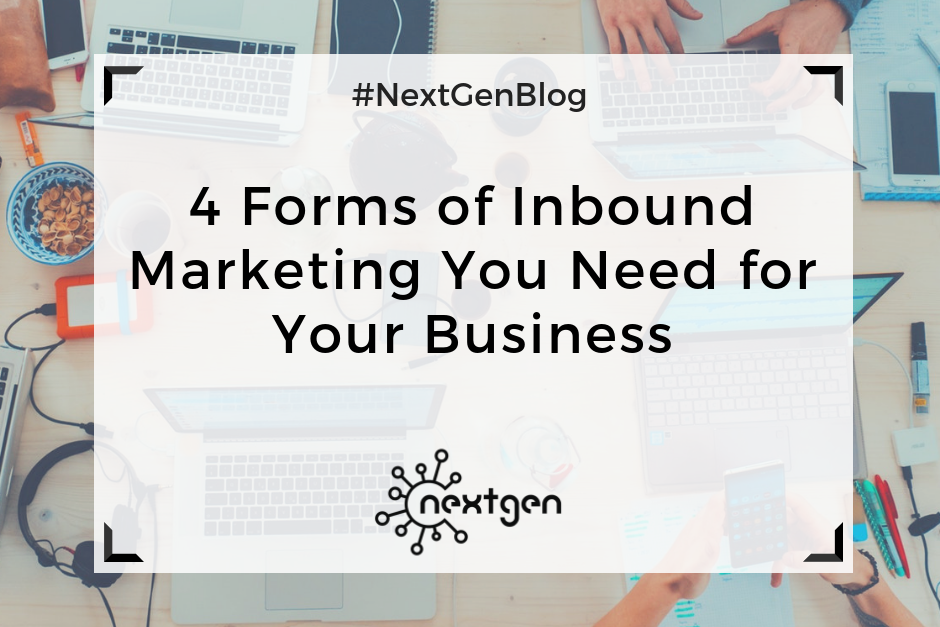
by Sofi | Jan 19, 2018 | Other
Inbound marketing is a type of marketing that focuses on creating valuable content to attract customers or leads. With inbound marketing customers come to your business, unlike outbound marketing where you try to find customers via traditional marketing methods. Inbound marketing is an inexpensive method and can generate great returns. This is why it’s heavily used by so many businesses in the recent years.
There are different inbound marketing forms you can use to improve your business, so here are the 4 most popular and effective ones.
#1 Social media marketing
Social media is a place where you can reach a wide and diverse audience at any time and easily create brand awareness. You can communicate and connect with customers and prospects, you can advertise your business at a low cost, and you can attract target audiences by creating great content. On social media the power is in the hands of the people, because they can choose to follow or unfollow you whenever they want. So, it’s important for you to focus on delivering valuable content that will keep people interested in your business.
#2 Content marketing
One of the best ways to inform people about your business is by delivering relevant content. You can create and share content in different forms, including photos, videos, articles, etc. However, one of the most popular types of content creation is blogging. You can write blogs about news, experiences, advices, and other information related to your products or industry. You should always try to create informative and educational blog posts, so your readers can find them useful. If your content is good, they might become your regular readers, and later customers.
#3 SEO
Search engine optimization is the process of increasing the traffic to your website by getting high rankings in search results on search engines. To achieve this, you should optimize the content on your website. Keywords have a key role in doing this, and they are the foundation of every SEO campaign. To choose the right keywords for your business you should research keywords and find which of them are niche for your market, see how competitive they are, and then create your own target keywords. Once you choose your keywords, you should start including them in your website’s content.
#4 Email marketing
Email marketing can be used as both inbound and outbound marketing method. If you use email marketing to attract highly qualified leads organically, then it’s considered inbound. To create a successful inbound email marketing campaign, you should always have a well-defined strategy, a good tool for creating and segmenting your lists, be creative and create good content, and send emails regularly. To achieve best results, you can use emails to send different types of content depending on your goal and your audience, including: newsletters, promotions, blog content, holiday greetings, birthday messages, and others.
***
These forms of inbound marketing are becoming a must-have for many businesses in the digital age. If you want to attract visitors by providing value, in a cost-effective way that can generate great returns, then inbound marketing is the way to go.

